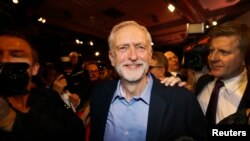Jeremy Corbyn, a veteran left-winger who professes an admiration for Karl Marx, was elected leader of Britain's opposition Labor Party on Saturday, a victory that may make a British EU exit more likely and that one former Labor prime minister said could leave the party unelectable.
Corbyn's triumph was greeted by cheers from supporters at Labor Party headquarters and hailed by radicals across Europe. The outcome opened up the prospect of deep internal divisions, with some skeptics fearing he would repel voters by pushing such radical policies as unilateral nuclear disarmament, nationalization and wealth taxes.
Corbyn, 66, who was considered an unlikely winner when he entered the leadership contest, said in his acceptance speech: "Things can and they will change."
He won 59.5 percent of votes cast, a far larger victory margin than anyone had envisaged.
"I say thank you in advance to us all working together to achieve great victories — not just electorally for Labor, but emotionally for the whole of our society, to show we don't have to be unequal, it doesn't have to be unfair, poverty isn't inevitable," he said.
Corbyn's victory reflects growing support for left-wing movements across Europe, with Syriza winning Greek elections in January and Spain's anti-austerity Podemos party performing well in opinion polls. Both parties welcomed the news.
"The election of Corbyn to the Labor leadership ... is a significant boost to the pan-European front against austerity and sends a message of hope to European peoples," Syriza said in a statement.
Corbyn's rise also has an echo of the way Senator Bernie Sanders of Vermont has galvanized left-leaning Democrats in his bid to win his party's nomination for the U.S. presidential race over Hillary Clinton.
However, the scale of division Corbyn's victory has created in his own party was immediately laid bare, with one Labor lawmaker quitting his role as a health spokesman while Corbyn was making his acceptance speech. Others quickly followed, saying they would not serve in Corbyn's senior team.
"My job is going to be a complicated one, that I fully understand," Corbyn said at a celebration in the tiny Sanctuary House pub near Parliament. Hundreds of his supporters sang the socialist anthem "The Red Flag," Labor's traditional song since 1925.
Corbyn, a vegetarian and an opponent of the British monarchy, originally received fellow Labor lawmakers' backing in the leadership contest to ensure a wide debate. Since then, however, he struck a chord with many in the party by repudiating the pro-business consensus of Tony Blair, a three-time election victor for Labor who is now widely unpopular, not least because of his involvement in the invasion of Iraq.
Corbyn has proposed new taxes on Britain's wealthiest classes and is ambiguous on the controversial question of whether the nation should leave the European Union. He is a strong opponent of military strikes in Syria, meaning it would be harder for Prime Minister David Cameron to win parliamentary support for military action against Islamic State targets there.
"In moments of clamor, in moments of fervor, decisions are made — go here, invade here, bomb here, do this, do that," Corbyn said at a rally a few hours after his victory. "There's lots of military advice, there's lots of apparently simple and easy solutions. Tragically, wars don't end when the last bullet is fired or the last bomb is dropped."
Corbyn voted "no" on the question of Britain's joining the European Community in a plebiscite in 1975. His success now could make Britain's exit from the EU more likely when Cameron puts that question to a referendum by 2017.
Corbyn defeated two former Labor ministers, Yvette Cooper and Andy Burnham, and Liz Kendall, regarded as an heir to Blair.
A parliamentary veteran of more than 30 years with a long history of voting against his own party, Corbyn triumphed on a message of increasing government investment through increasing the money supply and renationalizing vast swaths of the economy.
Asked repeatedly whether he supported the views of Karl Marx, co-author of "The Communist Manifesto," Corbyn has said that Marx "was essentially a fascinating figure who observed a great deal and from whom we can learn a great deal."
Expressions of admiration for Marx have been largely taboo in the top echelons of Labor since a battle in the 1970s and 1980s to expunge the influence of Marxist militants in the party. Even the word "socialism," which trips easily from Corbyn's lips, has been handled somewhat gingerly.
The prospect of a return to the party's socialist origins, in commitment to partnership with trade unions and state ownership, has drawn stark predictions that Labor could be annihilated in the next national elections, in 2020. The British public supported Cameron and his Conservative Party strongly in elections four months ago, after a campaign marked by the prime minister's promise to cut government spending on welfare.
"The [Labor] party is walking eyes shut, arms outstretched, over the cliff's edge to the jagged rocks below," centrist Blair, the former prime minister, said in a last-minute plea to stop the Corbyn surge.
However, Ed Miliband who led the Labor Party to its heavy defeat at the polls in May, rejected Blair's prediction that the party faced annihilation.
